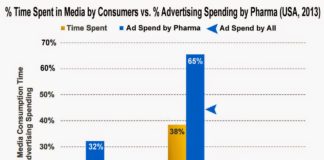My friend, Dr. Bertalan Meskó (@Berci) writes (here):
Dear Pharma Companies,
The place of Wikipedia in the dissemination of medical information online is indisputable now. If you want your customers to access information about your products from the quality perspective and in the simplest way, you have to deal with using Wikipedia.
Based on the pretty negative past encounters between pharma employees and Wikipedia editors (pharma employees trying to edit entries about their own products in a quite non-neutral way), we advise you to employ a Wikipedia editor if you want to make sure only evidence-based information is included in entries about your own products. Appointing someone from within your company as a “spokesperson” in Wikipedia who would perform all edits on behalf of the company is an excellent way to update those entries.
For more details, please see our open access social media guide [see my review here].
But basically, we, Wikipedians, are more than open to starting a discussion about this with you.
I’m looking forward to working together.
Dr. Bertalan Mesko
Webicina.com
I respect Berci and agree that pharmaceutical companies should employ full-time resources to monitor social media sites like Wikipedia and submit what they consider “corrective” information about products. But, IMHO, it ain’t goin’ to happen!
Boehringer Ingelheim (BI) responded to Berci via Twitter: “We look for patient safety issues & react. Its important to stick to Wikipedia policies too, so all transparent.” But when asked by Berci if BI had posted anything online about this, BI responded “No at this point in time we have not….yet,” seemingly leaving the door open.
But I am sure that no pharma company will ever — in this economy — hire someone just to monitor Wikipedia and write Wikipedia entries.
But why stop at Wikipedia? There’s are other social media platforms that also need dedicated resources — such as Twitter, Facebook, numerous patient discussion boards, and now Pinterest.
Many brand managers have probably hired outside agencies to monitor what people are saying about brands on social media sites, but the goal is not to issue “corrective information.” It’s more a matter of market research and measuring share of voice, that sort of thing (maybe also actively monitoring for safety issues as BI mentioned). These agents are temporary help and the companies will never hire anyone to do this full-time in-house. In fact, many social media pioneers within pharma companies have “moved on” (ie, lost their jobs); see, for example, “Is There an Upward Career Path Within Pharma for Social Media Pioneers?“









![6 Digital Tools at the Center of Healthcare Digitalization [INFOGRAPHIC]](http://ec2-54-175-84-28.compute-1.amazonaws.com/pharma-mkting.com/wp-content/uploads/2021/04/6DigitalTools_600px-100x70.jpg)




